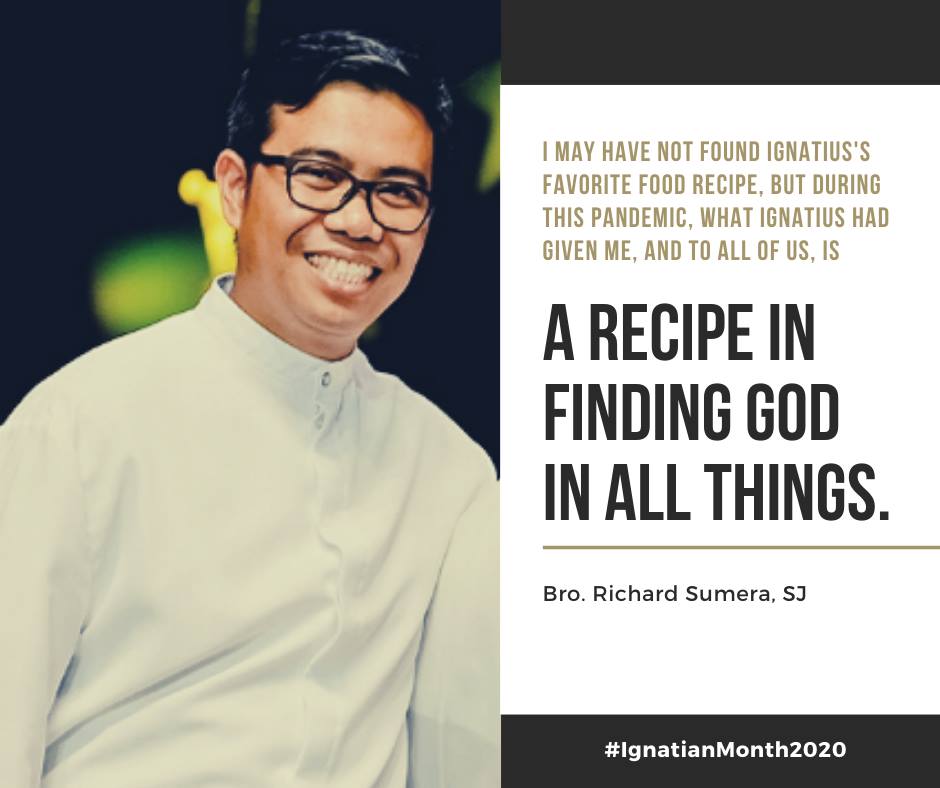I wonder if Ignatius loved to cook. What might have been his favorite recipe? When the pandemic resulted in lockdowns and quarantines, almost all of us resorted to home-cooked meals. Perhaps now is the best time to try Ignatius’s recipes since we are secluded in our own homes during this pandemic.
His recipe would have been influenced by what he had eaten during his time. When Ignatius was under the care of his nanny in the Basque region of Spain, he was probably eating cured meat, vegetables, bread, and a lot of apples as it was plentiful in that area. After his cannonball convalescence and spiritual conversion, he left home and searched for a way towards God. He might have fasted – like a lot, during his moments in isolation and deep prayer, and ate only bread he begged from strangers. When he was studying, and even after establishing the Society of Jesus, he might have been eating bread, pasta, beans, and sometimes meat.
In his autobiography, there was no mention of Ignatius cooking, however, there might have been a possibility that he did when he began to live with the first companions as a community in the early founding of the congregation. They had many shared tasks each day – communal prayers, catechism and preaching, begging of food, and house chores. It might have been plausible that Ignatius had to cook for the whole community as part of the task of doing house chores. What could he have cooked for his companions? Perhaps he prepared something of a soup containing beans, with some leftover meat shreds, and topped with stale bread. Since spices were not yet common then, he might have added only salt and some herbs as condiments.
In our Jesuit community in Cebu, we tried to do the house chores when the pandemic started. Since our cook, Ate Pam, was unable to report for work, we had to fend for ourselves and cook our food. I tried to replicate the recipe Ignatius might have had prepared. It was fun preparing it, but I had to resort to something else for it to be more palatable. During those moments when I had to bravely dice the onions into cubes or fry the fish in hot boiling cooking oil, there were three things, which Ignatius taught us Jesuits, which stood out for me: gratitude, giftedness, and community.
Gratitude. One of the best gifts from St. Ignatius was his Examination of Conscience. Ignatius taught us to begin the Examen always with gratitude. It is in this spirit of gratitude that we see how God has blessed us so abundantly amidst our sinfulness. We are grateful for the big things happening in our lives, and also of the minute details which keep us close to God. I felt this gratefulness while preparing the ingredients of a recipe that I would cook. I am thankful for the fishermen for the fish, I am grateful for the farmers for the rice and the vegetables, and many others for the fuel, for the pans, and many others. When we are grateful, we see the world with a deep sense of humility that God is at work in, with, and amongst us.
Giftedness. St. Ignatius knew of his giftedness, and all of these gifts he attributed back to God. Ignatius was intelligent and practical, and he confessed that God is the source of all these abundant gifts. Some of our students vibrantly exhibited this giftedness during this pandemic. I was pleasantly surprised to see them marketing their many products online – cookies, cakes, pastries, indoor plants, special drinks, etc. Much more commendable are those students who also produced something and generously gave them to the frontliners and to those who had lost their means. When our students are aware of their giftedness, they become confident, more generous, and self-giving. Like them, we are also gifted, probably in different ways, and are invited to participate in God’s work of mercy and compassion. I am reminded that in our mission, we have to “act as if everything depended on [us]; and trust as if everything depended on God.”
Community. When we cook for our family or the community, usually we think of what their preferences are. We take into consideration whether they are allergic to something, or if they are vegetarian, vegan, or carnivorous. When we cook, we not only consider our preferences but more importantly what is good for the whole community. This is where the Ignatian terms cura personalis and Ignatian discernment come into play. When we discern what is best for the other person, we infuse our dealings with much personal love and care. It is a known fact that Ignatius wrote at least 7,000 letters to his fellow Jesuits, their communities, and many lay collaborators. His correspondence with them was an exercise of both cura personalis and discernment. He cared for them, as to how he had experienced God’s care for him. Moreover, to be able to discern ways and means where he could be more loving and compassionate of the other, the discernment of spirits allowed him to choose the much better option between two good things.
I may have not found Ignatius’s favorite food recipe, but during this pandemic, what Ignatius had given me, and to all of us, is a recipe in finding God in all things. When we begin to see the world with the eyes of gratitude, we find ourselves blessed with so much giftedness, that we are drawn towards a magnanimous self-giving for God and others. This recipe for salvation is being able to do all things for Christ, AMDG, who is the center of our mission. In this pandemic, what is the recipe you would want to share with others? Is it something that nourishes the body, or is it good for the soul and spirit? Whatever form it may be, we hope that this recipe will allow us to see God more clearly, love Him more dearly, and follow Him more nearly.
*Bro. Richard taught pre-calculus and calculus at the Senior Highschool of Sacred Heart School – Ateneo de Cebu for 2 years. He returned to Manila this month to continue his studies in theology.
 The school offers not only excellent education but also forms servant leaders for the greater glory of God.
The school offers not only excellent education but also forms servant leaders for the greater glory of God.  Jesuit education promotes the holistic growth of an individual. The student is given experiences and opportunities that develop his spiritual, moral, psychological, social and intellectual development. Through these experiences, he learns to find God in all things. His education, gifts and talents are always directed towards the service of God and others and in this way he can become a person of excellence, leadership and service.
Jesuit education promotes the holistic growth of an individual. The student is given experiences and opportunities that develop his spiritual, moral, psychological, social and intellectual development. Through these experiences, he learns to find God in all things. His education, gifts and talents are always directed towards the service of God and others and in this way he can become a person of excellence, leadership and service.




